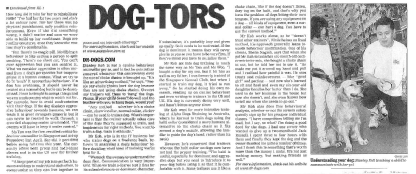



June 21, 2002
DOG-
There's a growing demand among pet owners for a 'holistic' alternative to conventional training. JAIME EE talks to three dog therapists about their training methods


DR-
Stanley Koh is not a canine behaviour counsellor per se, and in fact he gets rather annoyed whenever the controversy over the use of choke chains is brought up. 'It's like an advertising method,' he says. 'People say choke chains hurt the dog because they are not using choke chains. Owners say trainers tell them to 'hang' the dogs. Please. If your child doesn't do well and the teacher tells you to hang them, would you?
'Any method -
Mr Koh, who is in the IT business but who trains dogs on a freelance basis, believes in analysing a dog's behaviour before deciding what kind of training works best for it.
'We teach the owners to understand the dogs first. Communication is very important. When we train a dog we test it first for its submissiveness or dominant character. If submissive, it's probably lazy and gives up easily. So it needs to be motivated. If the dog is dominant it means they will never give in to you so you have to be very firm. If they're timid you have to socialise them.'
Mr Koh got into dog training in much the same way as Ms Tan and Ms Woo. 'I bought a dog for my son, but it bit him as well as my father. I was formerly trained at the Singapore Kennel Club, but when I started to train my dog, it tried to run away.' So he started doing his own research, reading up on canine behaviour and even writing to trainers in the US and UK. His dog is currently doing very well, and hasn't bitten anyone since.
Mr Koh went for more intensive training at Alpha Dogs Training in Australia, where he learned to train dogs using the halti collar (considered a more humane alternative to the choke chain as it fits around a dog's muzzle, allowing the handler to guide the dog's head, rather than its neck).
However, he's concerned that trainers who use the halti collar on dogs now have not had the proper training. 'The halti is useful, especially for dominant and aggressive dogs but you need to introduce it to your dog before using it so that it is comfortable with it. Some trainers use it like a choke chain, like if the dog doesn't listen, they tug on the halti, and that's why you have the problem of dogs biting their own tongues. If you are using any equipment on a dog -
Mr Koh works alone, as he 'doesn't trust other trainers'. While he has no fixed method, his approach generally leans towards behaviour modification. One of his clients, Shelia Nagiah, says that when she got Mr Koh to train her six-
Mr Koh also does free behavioural analysis, whether or not the owners subsequently sign up for his group or individual classes. 'I have competitors telling me I'm mad, but I say, so what? I'm doing a good deed for the dogs. I had one owner who wanted to give up a two-
'For more information, check out his website at www.dr-